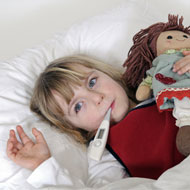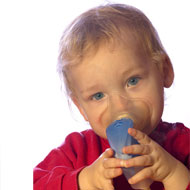Signs & Treatment For Pneumonia in Toddlers
Pneumonia is a condition that causes inflammation of the lungs. It is most commonly caused by viruses, bacteria or irritants. Pneumonias mostly affects people with a weakened immune system, therefore, toddlers suffering from colds can be easily stricken by the disease.
There are different types of pneumonia that affect people of all age groups, however, toddlers are more prone to contract the viral variety of pneumonia. Children of this age group are also prone to catching chickenpox, measles, and rubella; these illnesses are known to be direct causes for pneumonia among toddlers.
Symptoms of Pneumonia in Toddlers
Among toddlers, signs of pneumonia in toddlers are flu-like symptoms or upper respiratory illnesses that gradually develop into a bad cough. Other signs and symptoms of pneumonia in toddlers include labored breathing and the child straining when taking in a breath. Other signs of pneumonia in a toddler to watch out for are fever and wheezing. If the child develops a fever or is wheezing while sleeping these could all point to the onset of pneumonia.
Also watch for signs of respiratory distress, flaring of nostrils, rapid breathing, expelling of mucus when coughing, and retractions with breathing. These symptoms may appear mild at the start, but gradually get worse as the illness progresses. Some toddlers might also contact bacterial pneumonia. In this case, the signs to look out for are as follows: moderate to severe cough, high fever, rapid and strained breathing, chills, chest pain, tiredness, irritability, nausea, and diarrhea.
Treatment for Pneumonia in Toddlers
Pneumonia is diagnosed by checking for symptoms, a proper physical examination and a chest x-ray. The doctor may also recommend a blood test to determine the variety of pneumonia contracted.
For bacterial pneumonia the doctor will prescribe antibiotics. However, antibiotics are ineffective against viral pneumonia and children with viral pneumonia do not require specific antiviral medication. Remember that cough and cold medication are not recommended for children below 4 years of age. Instead, find out how the child’s breathing can be made a little more comfortable.
The doctor might recommend a test to determine the level of oxygen in the toddler’s blood. Based on the report the doctor may suggest breathing support in the form of oxygen or some nebulized bronchodilator medications. Today, pneumonia can be prevented through vaccination. These vaccines protect against some commonly occurring types of pneumonia, such as Haemophilus influenza (HIB), pneumococcal, measles, and the flu. Also, breastfeeding and preventing the toddler from inhaling smoke and fumes are effective ways to protect the child from this illness. Other preventive measures include the usual precautions that prevent the occurrence of colds and other upper respiratory illnesses.


